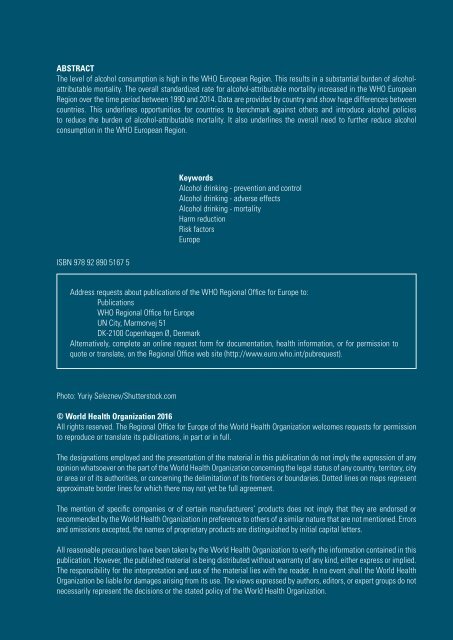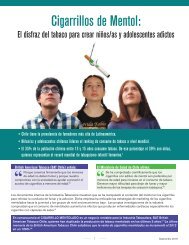Public health successes and missed opportunities
Public-health-successes-and-missed-opportunities-alcohol-mortality-19902014
Public-health-successes-and-missed-opportunities-alcohol-mortality-19902014
Create successful ePaper yourself
Turn your PDF publications into a flip-book with our unique Google optimized e-Paper software.
<strong>Public</strong> <strong>health</strong> <strong>successes</strong> <strong>and</strong> <strong>missed</strong> <strong>opportunities</strong><br />
ABSTRACT<br />
The level of alcohol consumption is high in the WHO European Region. This results in a substantial burden of alcoholattributable<br />
mortality. The overall st<strong>and</strong>ardized rate for alcohol-attributable mortality increased in the WHO European<br />
Region over the time period between 1990 <strong>and</strong> 2014. Data are provided by country <strong>and</strong> show huge differences between<br />
countries. This underlines <strong>opportunities</strong> for countries to benchmark against others <strong>and</strong> introduce alcohol policies<br />
to reduce the burden of alcohol-attributable mortality. It also underlines the overall need to further reduce alcohol<br />
consumption in the WHO European Region.<br />
Keywords<br />
Alcohol drinking - prevention <strong>and</strong> control<br />
Alcohol drinking - adverse effects<br />
Alcohol drinking - mortality<br />
Harm reduction<br />
Risk factors<br />
Europe<br />
ISBN 978 92 890 5167 5<br />
Address requests about publications of the WHO Regional Office for Europe to:<br />
<strong>Public</strong>ations<br />
WHO Regional Office for Europe<br />
UN City, Marmorvej 51<br />
DK-2100 Copenhagen Ø, Denmark<br />
Alternatively, complete an online request form for documentation, <strong>health</strong> information, or for permission to<br />
quote or translate, on the Regional Office web site (http://www.euro.who.int/pubrequest).<br />
Photo: Yuriy Seleznev/Shutterstock.com<br />
© World Health Organization 2016<br />
All rights reserved. The Regional Office for Europe of the World Health Organization welcomes requests for permission<br />
to reproduce or translate its publications, in part or in full.<br />
The designations employed <strong>and</strong> the presentation of the material in this publication do not imply the expression of any<br />
opinion whatsoever on the part of the World Health Organization concerning the legal status of any country, territory, city<br />
or area or of its authorities, or concerning the delimitation of its frontiers or boundaries. Dotted lines on maps represent<br />
approximate border lines for which there may not yet be full agreement.<br />
The mention of specific companies or of certain manufacturers’ products does not imply that they are endorsed or<br />
recommended by the World Health Organization in preference to others of a similar nature that are not mentioned. Errors<br />
<strong>and</strong> omissions excepted, the names of proprietary products are distinguished by initial capital letters.<br />
All reasonable precautions have been taken by the World Health Organization to verify the information contained in this<br />
publication. However, the published material is being distributed without warranty of any kind, either express or implied.<br />
The responsibility for the interpretation <strong>and</strong> use of the material lies with the reader. In no event shall the World Health<br />
Organization be liable for damages arising from its use. The views expressed by authors, editors, or expert groups do not<br />
necessarily represent the decisions or the stated policy of the World Health Organization.




